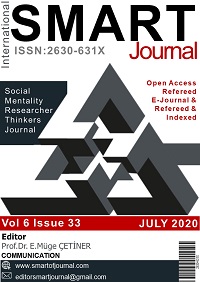Author :
Abstract
21. yüzyıl becelerileri için eğitim sistemindeki değişimler ile robotik ve kodlama eğitimi önemli bir yer edinmiştir. Robotik eğitimindeki materyallerin temelinde LEGO setleri bulunmaktadır. WEDO 2.0 robotik seti ile öğrencilerin disiplinlerarası bilgiler öğrenmeleri amaçlanmaktadır. Günümüzde robotik ve kodlama eğitimi önemli bir yere sahip olmasına rağmen başarı düzeyiyle ilgili bilgi verecek ölçme aracı oldukça sınırlıdır. Çalışmamızda; Wedo 2.0 setiyle verilen robotik ve kodlama eğitiminin, fen bilimleri dersine yönelik geçerliği ve güvenirliğini sağlama amacıyla başarı testi geliştirilecektir. Bu test 6. 7. ve 8. Sınıftaki 111 öğrenciye uygulanmıştır. 35 maddeyle oluşturulan test, geçerliği sağlamak amacıyla uzman görüşü alınıp anlaşılabilirliği, alana ve öğrenci seviyesine uygunluğu, açılarından değerlendirilmiş ve dört madde testten çıkarılmıştır. Test sorularına madde analizi yapılmıştır. Testin son formundaki maddelerin güçlük değerleri .17 ile .91 arasında değer almış, ortalama güçlük indeksi 0.66 bulunmuştur. Testin güvenirlik analizi KR-20 değeri ,889 bulunmuş ve yüksek güvenilirlikte olduğu saptanmıştır. Geçerlik ve güvenirlik analizlerinden sonra test 24 madde olarak yapılandırılmıştır. Testin geçerli ve güvenilir bir ölçme aracı olduğu belirlenmiş ve Wedo 2.0 robotik setiyle, fen bilimlerine yönelik kazanımların ölçülmesi için uygun bir başarı testi geliştirilmiştir.
Keywords
Abstract
With the changes in the education system for integrating 21st century skills, robotics and coding education have become important. LEGO sets are one of the basic materials to be used in robotic education. WeDo 2.0 robotic set aims to help students learn interdisciplinary information. Although robotics and coding education has a very important role today, there are only few measurement tools giving information about the achievement level. The purpose of this study is to develop an achievement test whose validity and reliability is provided for science lesson within robotics and coding education by using WeDo 2.0 set. The test was applied to 111 students studying in 6th, 7th and 8th grades. The test which initially consisted of 35 items was evaluated in terms of its appropriateness to the field and students’ levels. However, as a result of expert opinion to ensure the validity and comprehensibility of the test four items were excluded from the test. Item analysis was performed on the questions. The difficulty values of the items in the final form of the test were between .17 and .91. The mean difficulty index of the test was found as 0.66. In terms of the reliability analysis of the test, KR-20 value was found to be .889. After the analysis, the test was structured as 24 item. As a consequence, the test was considered as a valid and reliable tool. An achievement test with high validity and reliability was prepared in order to measure target gains for science lesson within WeDo 2.0 robotic set.
Keywords
- Açıkgöz, M. ve Karslı, F. (2015). Validity and Reliability Analysis of Achievement Test Developed
- Açıkgöz, M. ve Karslı, F. (2015). Validity and Reliability Analysis of Achievement Test Developedon Work and Energy Using Alternative Measurement and Evaluation Techniques, Journal of Amasya University Faculty of Education, 4(1), 1-25.
- Adıgüzel, O. C. ve Özüdoğru, F. (2013). Developing an Academic Achievement Test for CommonCompulsory Foreign Language I Course in Universities, Trakya University Journal of Education Faculty, Volume 3, Number 2, 1-11.
- Akgün, A. ve Gülmez Güngörmez, H. (2017). Development of Scientific Reasoning Skills Test forSecondary School Students, 2. International Symposium On Social Sciences, (18-20 May 2017), Antalya/Alanya.
- Bingöl, A. ve Halisdemir, N. (2017). Academic Achievement Test Development Study for BasicInformation Technologies Course of University Students, The Journal of Academic Social Science Studies (JASSS), Number: 54 , p. 541-554.
- Büyüköztürk, Ş. (2009). Data analysis manual for social sciences: Statistics, research design, SPSS applications and interpretation (10th edition). Pegem A Publications, Ankara.
- Costa, M. F. & Fernandes, J. (2005) Robots at School. The Eurobotice project. Proceedings of Hsci2005
- Çepni, S. (2005). Science and Technology Teaching. Pegem-A Publications: Ankara.
- Çepni, S., Bayrakçeken, S., Yılmaz, A., Yücel, C., Semerci, Ç., Köse, E., Sezgin, F., Demircioğlu, G. ve Gündoğdu, K. (2008). Quantification and Consideration. Ankara: Pegem Publications.
- Çilenti, K. (1985). Science education technology: teaching, program and test development in science.
- Demir, N., Kızılay, E. ve Bektaş, O. (2016). Developing Achievement Test on 7th Grade Solutions:Validity and Reliability Study, Necatibey Faculty of Education Journal of Electronic Science and Mathematics Education (EFMED), Volume 10, Number 1, June 2016, pages 209-237.
- Goldworthy, A. (2000). Teaching Students How to İnvestigate, Paper Presented at the Annual Meeting of Science Conference. Nicosia. Cyprus.
- Kempa, R. (1986). Assessment in Science. Cambridge University Press, Cambridge, London.MEB. (2006). Primary Science and Technology Course (6th, 7th and 8th Grades) Curriculum, Head of Board of Education and Training, Ankara.
- Narlı, S., & Baser, N. E. (2008). A Quantitative Research on Developing a Success Test on"Cluster, Correlation, Function" and Describing the Readiness of the First Year Students of the Department of Mathematics in the Department of Mathematics.
- Ogan Bekiroğlu, F. (2004). How Successful ?, Classical and Alternative Measurement andEvaluation Methods and Applications in Physics (1st edition). Ankara: Nobel Publication Distribution.
- Özçelik, D. A. (2010). Quantification and consideration. Ankara: Pegem Academy. Tekin, H. (1992). Measurement and Evaluation in Education. Ankara: Yargı.
- Varış, Y. A. ve Cesur, D. (2012). Developing Achievement Test for Secondary Music Course,Turkish Studies - International Periodical For The Languages, Literature And History Of Turkish or Turkic Volume 7/4, Fall 2012, P. 3189-3198
